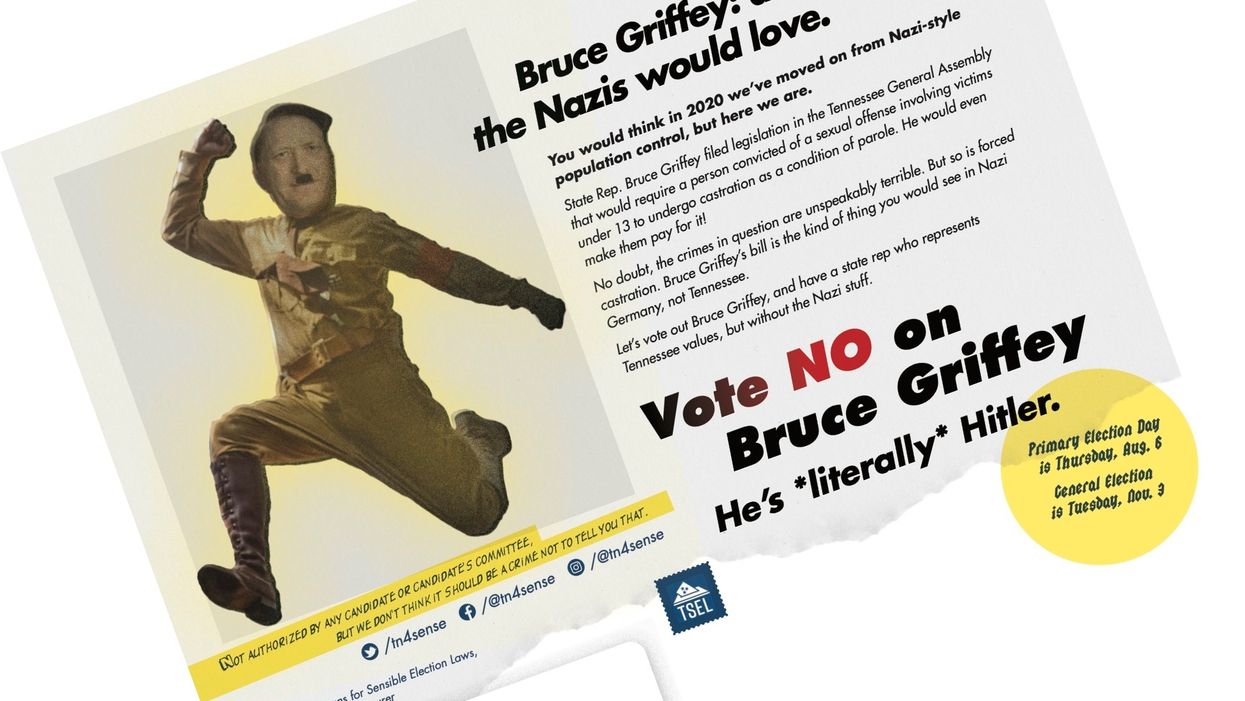In a campaign season when civil discourse seems headed to another record low, rhetorical excess has just been given a little extra boost.
For three decades Tennessee has made it a minor crime to put knowingly false statements about a candidate in oppositional campaign literature — one of the more explicit restrictions on political speech in the nation's law books. But last week a state judge said it was a bridge way too far over the First Amendment.
A prominent democracy reform group, Tennesseans for Sensible Election Laws, sued and won the right to declare in print something hyperbolic in the extreme: That a Republican state legislator is "literally Hitler," the Nazi fuhrer who died in Germany three-quarters of a century ago.
The point, the group said, was to produce a campaign flyer with obviously false assertions in order to test the law, which it says has been unconstitutionally stifling properly provocative satire and criticism of state officials.
"The framers of our Constitution believed that robust public speech and debate would be essential to self-government," it said. "This law tried to put its thumb on the scale, favoring the very people who enacted it — Tennessee state lawmakers — to the detriment of members of the voting public."
Judge Ellen Hobbs Lyle of Nashville agreed last week, declaring the law a violation of both the state and federal Constitutions. Its main flaw, she said, was that it punished false speech against a candidate but does nothing to rein in lies in support of a politician, "viewpoint dicrimination" not permitted by the First Amendment. She also said government regulators should not be in the business of distinguishing truth from falsity — and that the law bans far more speech than Tennessee could ever punish, besides.
"For emphatic and memorable communication in its campaign materials opposing candidates, the plaintiff uses the literary device of knowingly stating a literally false statement about a candidate in the context of satire, parody and hyperbole," the judge said in her nine-page ruling, and that's one of the Sensible Election Laws group's free speech rights.
The organization was taking on state Rep. Bruce Griffey, a Republican whose first term has been marked by proposing a wave of controversial, conservartuive culture war measures, including a ban on refugee resettlement in Tennessee and a requirement that students use school bathrooms that correspond with their sex at birth. And in January, he proposed a bill that would authorize the state to chemically castrate some people convicted of sex offenses against minors — a policy in place in at least seven states.
The good government group tweeted it would begin distributing its leaflets, which say "Bruce Griffey is LITERALLY HITLER" at the top and, underneath that, "Bruce Griffey: an agenda the Nazis would love."
The 1989 law makes it a misdemeanor punishable by a $50 fine and 10 days in jail to distribute "campaign literature in opposition to any candidate in an election" if any "statement charge, allegation, or other matter contained therein with respect to such candidate is false." It makes no exceptions for satire, hyperbole or parody.
The state attorney general's office has not announced whether it will appeal.
Griffey is solidly favored to win a second term in November in a rural district west of Nashville.




















Trump & Hegseth gave Mark Kelly a huge 2028 gift